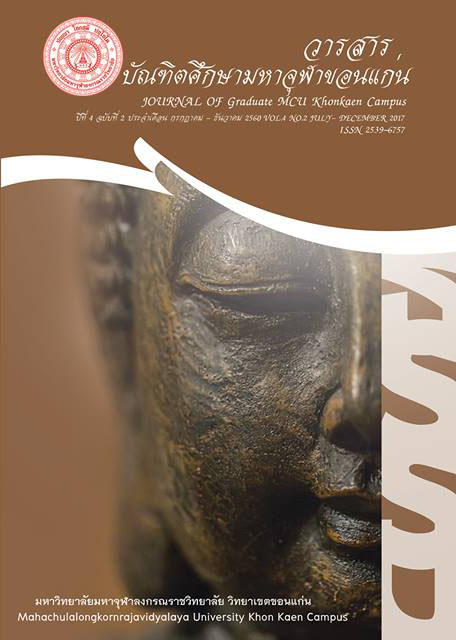ภาวะผู้นำในทศพิธราชธรรม
Main Article Content
Abstract
บทความนี้มีวัตถุประสงค์เพื่อศึกษาหลักทศพิธราชธรรม ซึ่งหมายถึงคุณธรรม 10 ประการของพระราชา นักปกครอง ผู้นำ ผู้บริหาร ประกอบด้วย 1) ทาน หมายถึง การให้วัตถุสิ่งของ ให้ ให้ธรรมทาน และให้อภัยทาน 2) ศีล หมายถึง ความประพฤติดีงามทั้งกายวาจาใจ 3) ปริจจาคะ หมายถึง การบำเพ็ญกิจด้วยการเสียสละประโยชน์ส่วนตนเพื่อประโยชน์ส่วนรวม 4) อาชชวะ หมายถึง ความซื่อตรง ซื่อสัตย์ 5) มัททวะ หมายถึง ความอ่อนโยน อัทยาศัยไมตรีเป็นมิตร 6) ตบะ หมายถึง ความทรงเดช ความเพียรพยายามเพื่อกำจัดความเกียจคร้านและความชั่ว 7) อักโกธะ หมายถึง ความไม่โกรธ ไม่เกลี้ยวกลาด 8) อวิหิงสา หมายถึง ความไม่เบียดเบียนรังแกให้ร้ายผู้อื่น 9) ขันติ หมายถึง คือ อดทนต่องานที่ตรากตรำ อดทนอดกลั้นต่ออารมณ์ที่ปรารถนาและไม่ปรารถนา และ 10) อวิโรธนะ หมายถึง ความไม่คลาดธรรม ความเที่ยงธรรม หลักทศพิธราชธรรม สามารถนำไปเสริมสร้างหลักภาวะผู้นำให้มีผลอุดมต่อตนเอง คนอื่นและกิจการหน้าที่ ประกอบด้วยหลัก 3 ประการ คือ 1) หลักภาวะผู้นำด้านกายภาพ ในทศพิธราชธรรมสอดคล้องกับหลักธรรมหมวดศีล คือ ทาน ศีล อวิหิงสา 2) หลักภาวะผู้นำด้านจิตภาพ ในทศพิธราชธรรมสอดคล้องกับหลักธรรมหมวดสมาธิ คือ ปริจจาคะ อาชชวะ มัททวะ อักโกธะ ขันติ 3) หลักภาวะผู้นำด้านปัญญาภาพ ในทศพิธราชธรรม สอดคล้องกับหลักธรรมหมวดปัญญา คือ อวิโรธนะ
This article is intended for educational purposes.Ten virtues of the king or Rājadhamma 10 in Buddhism were believed that it was the center of administration. The king who followed this principle strictly was actually praised as the king following Dhamma. The other administrators, a head of department, a leader of societies, etc. ought to follow the king’s behavior by following ten virtues of the king. The administrators who followed ten virtues of the king could make all members love, believe, give respect to and hold cooperation in work. This result helped the administrators to get successful in his given duty.Although ten virtues of the king was a principle for the king, they were still useful for a ruler, ruled people and the other people. When both a ruler and ruled people followed ten virtues of the king, they were successful in work with higher achievement. Peace and happiness would be brought to communities, societies, and nation by means of such ten virtues of the king. This principle was possibly included in Threefold Training: morality, concentration and wisdom. Morality in ten virtues of the king was Dāna, Sila and Avihimsa. Concentration in ten virtues of the king was Paricāgam, Ājjavam, Maddavam, Tapam, Akkodham and Khanti. Wisdom in ten virtues of the king was Avirodhana.

